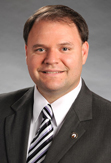The head of a state health agency reiterated his position Thursday that Georgia already has the authority now to pursue a Medicaid “waiver” plan to cover uninsured people.
That statement by Clyde Reese, commissioner of the Department of Community Health, runs counter to arguments made in a recent letter from Rep. Jason Spencer and other state legislators.
The letter asserted that the recent legislative budget provision permitting such a waiver is not sufficient, and that the General Assembly needs to pass a new, separate bill or resolution to allow such a step.
Spencer, a Woodbine Republican, has raised questions about a plan proposed by Grady Health System that would request a special 1115 waiver, an experimental plan that the feds approve to give states flexibility to improve their Medicaid programs by using a new approach.
Reese, an attorney himself, said the budget line item allowing a waiver process in the fiscal 2016 state budget — passed by the General Assembly — “constitutes legislative approval for the submission of the 1115 waiver.’’ He added that Gov. Nathan Deal agrees with him on this point.
Spencer responded Thursday by reaffirming his stand on the waiver. “I think we’re legally correct and constitutionally correct’’ to insist on new legislation, he said.
Reese told GHN that he would be meeting with Gov. Deal’s staff next week about the waiver proposal, generated by Grady Health System, that would adopt a new coverage program. Reese also said the agency has had “preliminary conversations’’ with federal officials about the so-called Grady plan, but declined comment on how receptive the feds were.
The waiver proposal focuses on using federal matching Medicaid dollars to help set up pilot sites that would give coverage to the uninsured, then manage their care and potentially improve their health.
Such a step would fall far short of statewide Medicaid expansion, as called for under the Affordable Care Act. The governor and his fellow Republicans who control the Legislature have stood firmly against expansion.
Grady in Atlanta, Memorial Health in Savannah, and a small group of rural hospitals are seen as the initial sites in the coverage plan, which has sparked much interest within the state’s health care industry.
Spencer, a longtime vocal opponent of the ACA, has said he considers the waiver a pathway to Medicaid expansion in Georgia, which he also opposes.
Debate over wording
He and three other Republican state representatives — David Stover of Newnan, Scot Turner of Holly Springs and Michael Caldwell of Woodstock — wrote the May letter to Reese. It cited another letter, from the state attorney general’s office, that said the General Assembly may not amend provisions of general law through an appropriations act.
Reese said Thursday that he agrees with the attorney general’s position, but that the “line item does not amend general law.”
Spencer responded to Reese by saying in an email to GHN:
“If Commissioner Reese agrees with the Attorney General’s opinion that ‘provisions of general law may not be amended by an appropriations act’ and still feels like the line item in the budget is proper authorization to approve pursuit of a Section 1115 waiver, then it appears he may be engaging in legal contortionism. Can years of prior Attorney Generals’ opinions be wrong?
“Members of the legislative branch are prepared to guard our policymaking prerogatives under the Georgia Constitution,’’ Spencer added.
Citing another attorney general’s opinion, Spencer said that “an appropriations act cannot restrict or alter the powers or duties conferred upon an agency by general law.”
“The supposed authorization in the line item attempts to confer authorization, which is not proper authorization,’’ he said.
A waiver plan must be approved as a separate bill or joint resolution of the General Assembly, Spencer said.


